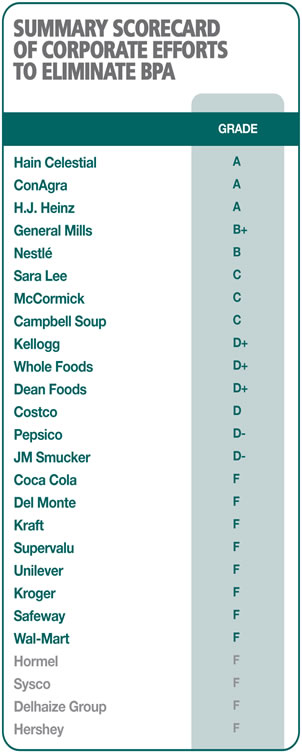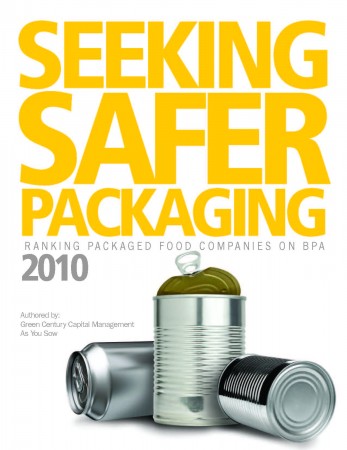Nearly every canned food and beverage product on the market today contains a highly controversial chemical, bisphenol A (BPA), in its lining. BPA has been linked to serious diseases and has been the focus of increasing consumer concern and regulatory restrictions. As investors, As You Sow and Green Century Capital Management (Green Century) believe companies may face financial risks from the presence of BPA in product packaging and should act quickly to eliminate the chemical to help protect shareholder value and preserve company reputations.
This report by Green Century and As You Sow builds on the first edition of Seeking Safer Packaging, published in April 2009, which ranked food and beverage companies on their efforts to address BPA in their product packaging. In this edition, the number of companies analyzed has expanded to include major U.S. retail companies that sell private-label canned products. The scoring and analysis for this report is based on a survey distributed to companies (see Appendix A & B).
Since the first publication of Seeking Safer Packaging in spring 2009, momentum to reduce exposure to BPA has increased. New scientific and investigative reports on the potential health impacts have been published, more states and localities are adopting restrictions, and consumer concern is rising. This report analyzes how companies are responding to this critical issue by disclosing information, exploring substitutes and committing to phase out BPA, and demonstrates that a growing number of companies are proactively mitigating BPA-related risks by testing and implementing substitute packaging.
The findings of this report indicate that notable progress has been made towards commercializing substitutes to BPA epoxy can linings. The overwhelming majority of companies that responded to the survey acknowledge some efforts to explore BPA-free packaging substitutes. Several have clearly become leaders by making direct company investments in identifying substitutes to BPA, and some have begun phasing out BPA from packaging. This report demonstrates that there are clear industry leaders, but unfortunately some of the largest companies are the biggest laggards in seeking substitutes to and phasing out BPA.

- Hain Celestial (A), whose brands include Health Valley, Earth’s Best, and Westbrae Natural, ConAgra (A), which owns brands such as Chef Boyardee, Hunt’s and Healthy Choice, and H.J. Heinz (A) are the highest-scoring companies in this report. Each of these companies has started using BPA-free can linings for certain products, is committed to removing the chemical from all of its packaging products, and has a timeline to achieve this transition.
- General Mills (B+), whose brands include Muir Glen, Progresso and Green Giant, also scores high in this report, mainly because it has committed to start using BPA-free can linings for one of its product lines (Muir Glen tomatoes). However, the company has not identified a timeline for continuing to phase out BPA from its remaining products.
- Nestlé (B) scores high for transparency, testing of substitute packaging and acommitment to eliminate BPA from packaging within “1 to 3 years.”
- ConAgra (A) and Campbell Soup (C), the company behind the iconic soups and other brands such as Swanson, were the most transparent in their survey responses on their extensive testing process for BPA-free can linings. ConAgra has “placed more than 40,000 cans into various test packs across [its] product lines. These packs have represented in excess of 380 different variables, supported by 8 coating suppliers and 4 can suppliers.” Campbell Soup has done “several hundred” tests, “with more than 500 this fiscal year alone.”
- Sara Lee (C) and McCormick (C) are both committed to eliminating BPA from packaging but have not begun using BPA-free substitutes.
- Whole Foods (D+), whose private-label brand is 365 Everyday Value, is the highest-scoring retailer, largely due to the company’s good transparency on this issue, but has not demonstrated that it is actively testing any BPA-free options for its private-label cans despite a commitment to eliminate the chemical from packaging.
- Kellogg (D+) is committed to eliminating BPA from can linings and has identified an internal timeline to do so, but is not actively exploring BPA-free packaging. Dean Foods (D+) is actively working to identify substitutions by investing company resources in the effort and contracting with suppliers, but has not committed to eliminating the chemical from packaging. Costco (D), whose private-label brand is Kirkland Signature, is committed to phasing out BPA once “a safe alternative becomes readily available,” J.M. Smucker (D) is testing alternatives, and PepsiCo (D-) has “an active program to explore alternatives,” but overall, these companies lag behind their peers which are further along in the process of implementing substitutes to BPA epoxy can linings.
- While clear leaders are emerging in the sector, many companies continue to fall short. Laggards identified by this scorecard include: Coca-Cola (F), Del Monte (F), Kraft (F), Unilever (F), Kroger (F), Safeway (F), Supervalu (F) and Wal-Mart (F). Most of these companies are exploring substitutes to BPA to some degree but do not commit to phasing out the chemical, are not funding the exploration of substitutes, and fail to sufficiently disclose information about how they are addressing consumer concern on the issue.
- Delhaize Group (F), Hershey (F), Hormel (F), and Sysco (F) failed to respond to the survey, demonstrating a disconcerting lack of transparency on this issue.
Given rising consumer and regulatory concerns, Green Century and As You Sow recommend that all companies make significant investments in phasing out BPA from products and take aggressive action to remove it where feasible and safe substitutes exist. Companies should also increase transparency on how they are responding to consumer concerns and possible risks to shareholder value associated with the chemical. Innovative companies that are spearheading the transition to BPA-free packaging for canned goods are sending a clear message to investors that they are looking to stay ahead of the market and gain an edge over competitors.



